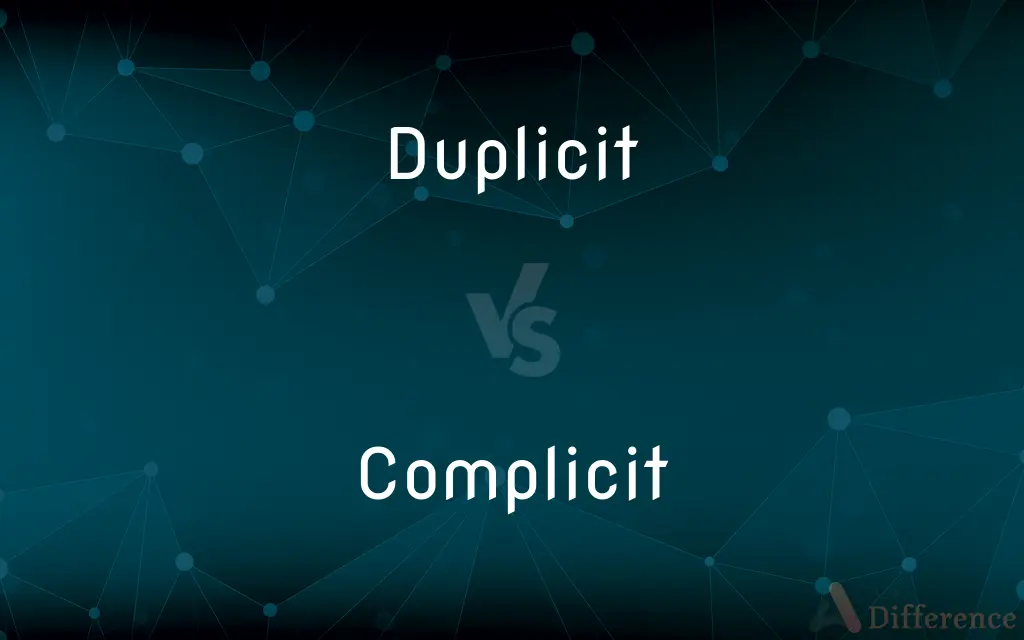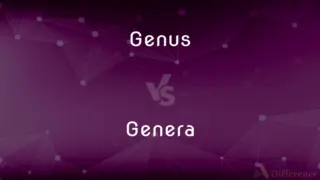Duplicit vs. Complicit — What's the Difference?
Edited by Tayyaba Rehman — By Fiza Rafique — Updated on March 20, 2024
Duplicitous involves deceitfulness, while complicit refers to participation in wrongdoing.

Difference Between Duplicit and Complicit
Table of Contents
ADVERTISEMENT
Key Differences
Duplicitous behavior is characterized by deceit and double-dealing, where an individual or entity presents false information or acts in contradictory ways to mislead others. It involves a deliberate attempt to deceive, betray, or mislead, often for personal gain or to achieve a specific outcome. On the other hand, being complicit means being involved with others in an illegal activity or wrongdoing. It doesn’t necessarily involve active participation in the deceptive act but rather a passive agreement or failure to act against it.
While a duplicitous person actively engages in deceitful practices, someone who is complicit may not directly engage in deceit but instead supports or enables it through their inaction or indirect involvement. For instance, a duplicitous individual might lie about their intentions, whereas a complicit person might know about the lie and do nothing to stop it, or even help conceal it.
The consequences of duplicitous behavior often include a loss of trust and credibility once the deceit is uncovered. In contrast, complicit individuals may face legal or social repercussions for their role in supporting or hiding wrongdoing, even if they were not the principal actors in the deceitful action.
Duplicitous actions are inherently active, involving manipulation, fabrication, or deception to achieve a hidden agenda. Conversely, complicity can be seen as a more passive role, where the individual or entity does not take direct action but is aware of the wrongful act and chooses not to prevent it or to aid it indirectly.
Understanding the difference between being duplicitous and complicit is crucial in legal, social, and ethical contexts. It helps in identifying not only those who actively engage in wrongful deeds but also those who, by their silence or indirect support, allow such deeds to continue.
ADVERTISEMENT
Comparison Chart
Definition
Engaging in deceitful and double-dealing behavior.
Being involved with others in wrongdoing or illegal activity.
Nature
Active involvement in deception.
Passive agreement or failure to act against wrongdoing.
Consequences
Loss of trust and credibility.
Legal or social repercussions for supporting or hiding wrongdoing.
Key Behavior
Manipulation, fabrication, or deception.
Awareness of wrongdoing and choosing not to prevent it.
Contexts
Often personal gain or achieving a specific outcome.
Involvement in or support of illegal or unethical acts.
Compare with Definitions
Duplicit
Betrayal.
His duplicitous betrayal led to the downfall of their alliance.
Complicit
Involvement in Wrongdoing.
They were complicit in the scheme, despite claiming ignorance.
Duplicit
Double-dealing.
The duplicitous merchant sold faulty goods while claiming high quality.
Complicit
Enabling Wrongdoing.
The company's management was complicit in overlooking safety violations.
Duplicit
Misleading.
Duplicitous advertising practices misled consumers about the product's benefits.
Complicit
Passive Agreement.
By remaining silent, he was complicit in the fraudulent activities.
Duplicit
Contradictory Actions.
Her duplicitous statements confused everyone about her true intentions.
Complicit
Failure to Act.
Their complicity was shown by their failure to report the misconduct.
Duplicit
Deceitful Behavior.
The spy engaged in duplicitous activities to mislead the enemy.
Complicit
Indirect Support.
She was complicit in hiding the evidence, even if she didn't participate in the crime.
Duplicit
Duplicitous; two-faced; deceitful
Complicit
Involved with others in an activity that is unlawful or morally wrong
The careers of those complicit in the cover-up were blighted
Complicit
Associated with or participating in a questionable act or a crime; having complicity
"Presidential handlers and a complicit press corps managed to suppress public awareness" (Andrew P.N. Erdmann).
Complicit
Associated with or participating in an activity, especially one of a questionable nature.
Common Curiosities
What does complicit mean?
Complicit refers to being involved with others in an illegal activity or wrongdoing, either through passive agreement or indirect support.
What does it mean to be duplicitous?
Being duplicitous means engaging in deceitful, double-dealing, or contradictory behavior to mislead others.
What are the consequences of being complicit?
Consequences can include legal repercussions, loss of reputation, or social ostracism, depending on the nature and severity of the involvement.
How can duplicitous behavior be identified?
Duplicitous behavior can often be identified through inconsistencies in actions and statements, or when an individual’s words do not match their actions.
Can someone be both duplicitous and complicit?
Yes, an individual can be both if they actively engage in deceit while also supporting or covering up others' wrongful acts.
How does society view duplicitous and complicit behaviors?
Both behaviors are generally viewed negatively, as they contribute to unethical, deceitful, or illegal activities.
How can one address complicit behavior in a workplace?
Addressing complicit behavior involves establishing clear ethical guidelines, encouraging transparency, and creating a safe environment for reporting wrongdoing.
Is complicity always intentional?
While complicity often involves a degree of awareness, individuals may sometimes be unwittingly complicit if they are unaware of the full extent of the wrongdoing.
Can organizations be complicit?
Yes, organizations can be complicit if they, through their policies or lack of action, enable or cover up wrongdoing.
What role does intent play in duplicitous behavior?
Intent is central to duplicitous behavior, as it involves a deliberate effort to deceive or mislead.
What impact does duplicitous behavior have on relationships?
Duplicitous behavior can severely damage trust and credibility, leading to strained or broken relationships.
Why is it important to distinguish between duplicitous and complicit behaviors?
Distinguishing between them is crucial for accurately understanding and addressing different roles in unethical activities, ensuring appropriate responses and accountability.
What is the difference between being deceptive and duplicitous?
Deception involves misleading others, which is a part of duplicitous behavior, but being duplicitous includes a broader pattern of deceitful actions and contradictions.
How can individuals prevent becoming complicit in unethical activities?
By staying informed, adhering to ethical standards, and speaking out against wrongdoing, individuals can avoid complicity.
Can legal action be taken against someone for being complicit?
Yes, if their complicity in wrongdoing violates laws or regulations, legal action can be taken.
Share Your Discovery

Previous Comparison
Meme vs. Gif
Next Comparison
Genus vs. GeneraAuthor Spotlight
Written by
Fiza RafiqueFiza Rafique is a skilled content writer at AskDifference.com, where she meticulously refines and enhances written pieces. Drawing from her vast editorial expertise, Fiza ensures clarity, accuracy, and precision in every article. Passionate about language, she continually seeks to elevate the quality of content for readers worldwide.
Edited by
Tayyaba RehmanTayyaba Rehman is a distinguished writer, currently serving as a primary contributor to askdifference.com. As a researcher in semantics and etymology, Tayyaba's passion for the complexity of languages and their distinctions has found a perfect home on the platform. Tayyaba delves into the intricacies of language, distinguishing between commonly confused words and phrases, thereby providing clarity for readers worldwide.














































